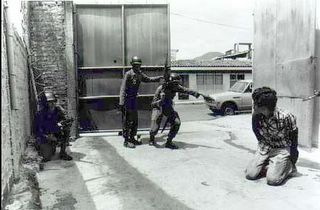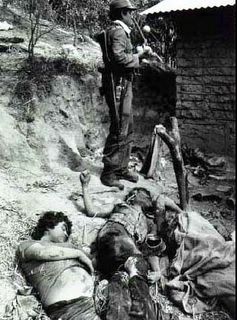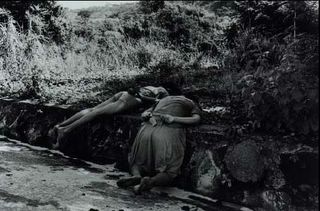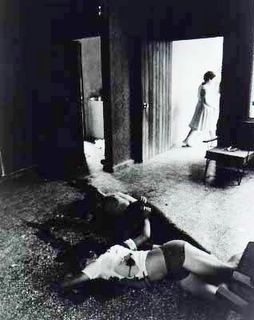'Salvador option' for Iraq Mr Negroponte?
The US colonel in charge at the close of El Salvador's civil war was a tall man with a shaven head, which, as a colleague put it, "looked as if it would repel cannonballs".
I remember him commenting on how he had been glad to serve in El Salvador because he believed the United States had corrected the mistakes of Vietnam, learning at last the formula to defeat future insurgencies.
So it has been with little surprise that I have read articles coming out of Washington in recent weeks, with US officials talking about a "Salvador Option" in Iraq, not only for democracy-building, but also for a more aggressive campaign to eliminate Iraqi insurgents and their supporters.

Soldiers arresting a student
It is one of a collection of small republics in the US backyard which, during the Cold War, Washington considered too strategically important to fall to communism.For decades the US propped up brutal dictatorships. But repression created fertile ground for Marxist guerrillas.
So in the 1980s, the US belatedly switched to democracy-building to stop the revolutions sweeping the region.
President Reagan promised to draw the line against further communist expansion in El Salvador.
There followed a bloody 12-year stalemate between the US-funded and organised Salvadoran army, and Cuban-backed guerrillas. Between one and two percent of the population - more than 70,000 people - died.
Tens of thousands of those killed in the war were rebel sympathisers, tortured and murdered by the security forces.

Soldier juggling after "cleanup operation"
It was a well-organised, dirty war in which the CIA was heavily involved. Horrendously mutilated corpses - sometimes decapitated - were left in full public view.Using fear,the policy succeeded in denying the rebels open civilian support.

Two sisters killed by the Death Squad
Some in the Pentagon have now been mooting the idea of training Iraqi hit squads to target insurgents and their sympathisers to quash open civilian support for them.But for this to work would mean out-terrorising the Iraqi rebels, a difficult task indeed. Nor is success for a Salvador-style death squad democracy guaranteed.
Constituent assembly elections, like those taking place in Iraq, were held in 1982, but the war continued for another decade with the rebels rebuilding their strength.
In November 1989, they launched an all-out offensive to win, taking over suburbs of the capital for 10 days.Fearing defeat, the US-backed army set out to kill not only guerrillas but also those they viewed as sympathisers.
Of the memories of death and mutilation I witnessed in El Salvador, the sight of six Jesuit priests, their cook and her 16-year-old daughter with their brains blown across the neatly cropped lawn of their house, is the one that still haunts the most. They were among the country's leading intellectuals, and I knew them well.
They were murdered by an elite US-trained unit, part of an extermination list approved by the high command, a dirty war taken to the limit.

Two children slain by National Guard
The failure of US strategy in El Salvador is perhaps measured by its inability in 12 years to capture or kill a single top guerrilla commander in a country only the size of Belgium.
In the end, years more bloodshed and a potentially humiliating US defeat were only prevented by the Soviet collapse, which pulled the rug from under the guerrillas' feet.
George Bush Snr called in the United Nations to mediate peace and sort out the mess.
It seems a strange model to choose now for Iraq. Link
Torture at CIA Battalion 316:
The Record of Washington's Ambassador to Iraq
[John Dimitri Negroponte]
photos [used above] by JOHN HOAGLAND 1983-1984
See John Hoagland, Combat Photographer
by Maggie Jaffe
From Our Own Correspondent was broadcast on Thursday, 27 January, 2005, at 1100 GMT on BBC Radio 4.






<< Home